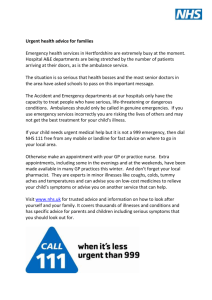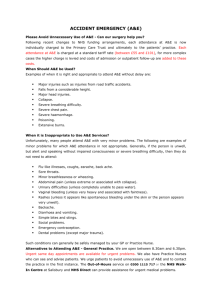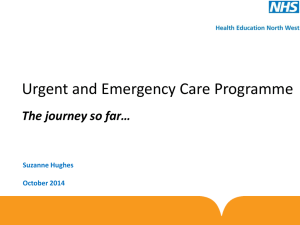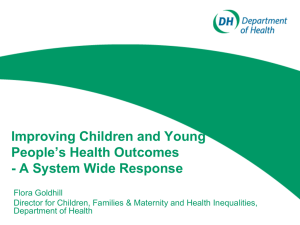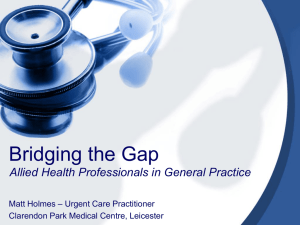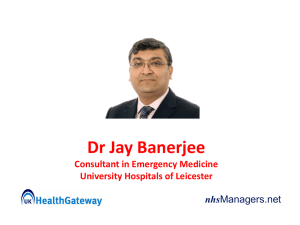HEI Innovation Fund - Health Education England
advertisement
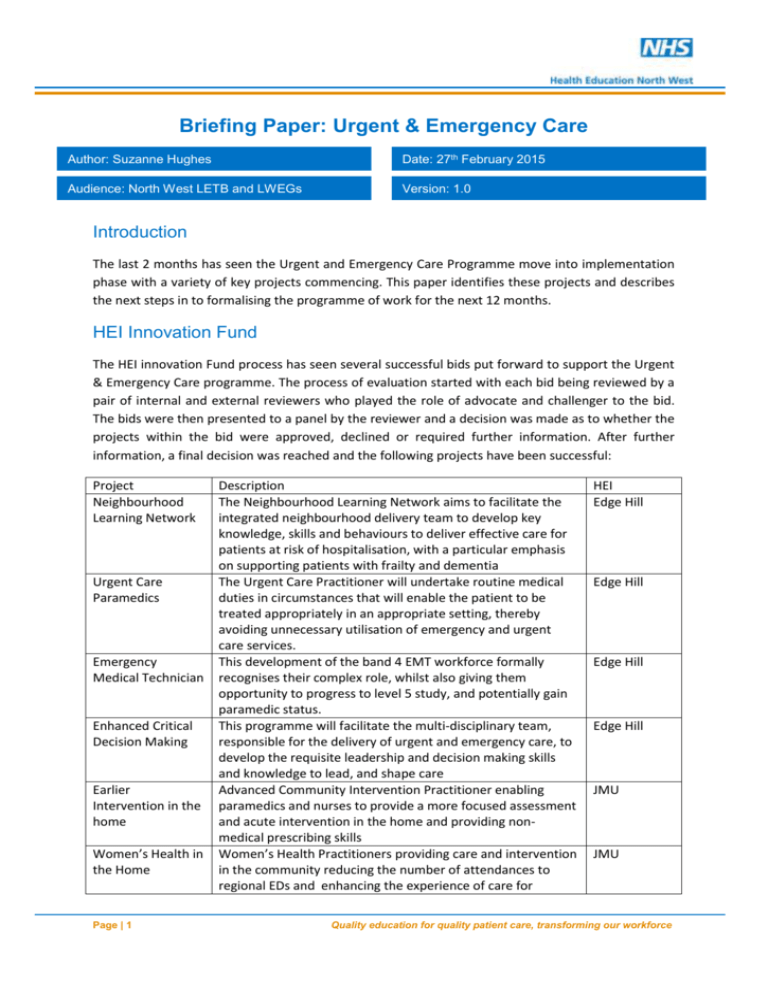
Briefing Paper: Urgent & Emergency Care Author: Suzanne Hughes Date: 27th February 2015 Audience: North West LETB and LWEGs Version: 1.0 Introduction The last 2 months has seen the Urgent and Emergency Care Programme move into implementation phase with a variety of key projects commencing. This paper identifies these projects and describes the next steps in to formalising the programme of work for the next 12 months. HEI Innovation Fund The HEI innovation Fund process has seen several successful bids put forward to support the Urgent & Emergency Care programme. The process of evaluation started with each bid being reviewed by a pair of internal and external reviewers who played the role of advocate and challenger to the bid. The bids were then presented to a panel by the reviewer and a decision was made as to whether the projects within the bid were approved, declined or required further information. After further information, a final decision was reached and the following projects have been successful: Project Neighbourhood Learning Network Urgent Care Paramedics Emergency Medical Technician Enhanced Critical Decision Making Earlier Intervention in the home Women’s Health in the Home Page | 1 Description The Neighbourhood Learning Network aims to facilitate the integrated neighbourhood delivery team to develop key knowledge, skills and behaviours to deliver effective care for patients at risk of hospitalisation, with a particular emphasis on supporting patients with frailty and dementia The Urgent Care Practitioner will undertake routine medical duties in circumstances that will enable the patient to be treated appropriately in an appropriate setting, thereby avoiding unnecessary utilisation of emergency and urgent care services. This development of the band 4 EMT workforce formally recognises their complex role, whilst also giving them opportunity to progress to level 5 study, and potentially gain paramedic status. This programme will facilitate the multi-disciplinary team, responsible for the delivery of urgent and emergency care, to develop the requisite leadership and decision making skills and knowledge to lead, and shape care Advanced Community Intervention Practitioner enabling paramedics and nurses to provide a more focused assessment and acute intervention in the home and providing nonmedical prescribing skills Women’s Health Practitioners providing care and intervention in the community reducing the number of attendances to regional EDs and enhancing the experience of care for HEI Edge Hill Edge Hill Edge Hill Edge Hill JMU JMU Quality education for quality patient care, transforming our workforce Health Education North West Specialist Practitioner ED Pharmacist Community Pharmacist Emergency Medical Technician Advanced Community Paramedic ED Pharmacist Community Pharmacist Mental Health training for ED staff women and their families A programme of study designed to empower a broad range of community based, urgent, primary care, and social care related workers to provide clients with alternatives to seeking treatment at a hospital based emergency department; and the provision of a collated e-health resources to aid the healthcare clinician in assessing, treating, and /or signposting clients to further care. By providing clinical pharmacists with skills in diagnosis and emergency care, we aim to provide emergency departments with a prescribing workforce capable of implementing the medicines optimisation agenda While community pharmacists are competent to deal with the common minor ailments, there is potential to expand the list of conditions they can manage, treat and support. This would include new diagnostic skills, ability to provide other medicines under patient group directions and confidently manage cases including follow up of patients This development of the band 4 EMT workforce formally recognises their complex role, whilst also giving them opportunity to progress to level 5 study, and potentially gain paramedic status. Better use of skill mix in urgent care, prevention of A&E admissions Pharmacists can be employed within A&E settings to manage people arriving with medicines supply issues, as well as support management/treatment of minor ailments Common ailments can be effectively and economically treated in community pharmacy settings, plus emergency medicine supply and vaccination service. Improve understanding of mental health issues for existing staff Chester Manchester University Manchester University North Lancs & Cumbria collaborative North Lancs & Cumbria collaborative North Lancs & Cumbria collaborative North Lancs & Cumbria collaborative North Lancs & Cumbria collaborative The transformation team have also taken forward 2 initiatives put forward as part of Edge Hill’s HEI Innovation bid for Person Centred Care and Care Home Staff Development. All these projects are being developed and will be delivered in 2015/16. For further information on the courses, please contact the HEI in the first instance or Suzanne.hughes@nw.hee.nhs.uk National ED Pharmacist Pilot HEE is supporting NHS England in the Urgent & Emergency Care Review by reviewing and recommending various workforce solutions. One of these is looking at the role of the ED Pharmacist and as such a project has been set up inviting LETBs to participate in a national pilot to further evaluate the role. The project – the first of its kind in the UK – will aim to build upon research Page | 2 Quality education for quality patient care, transforming our workforce Health Education North West conducted in the West Midlands from April 2013 by Health Education West Midlands (in cooperation with regional partners). This research identified a potential role for the pharmacist in areas such as pre-discharge medicines optimisation in the Emergency Department (ED) and Acute Medicine Units, as well as within Clinical Decision Teams in the undertaking of medicines-related and minor illnessfocussed clinical duties. Such duties are currently undertaken by junior medical staff, who face significant demands on their time with emergency admissions. Whilst the current skills of the Pharmacist were recognised as playing a part in the urgent and acute setting, a skills gap relating to clinical diagnosis and “minors” (minor injury and minor illness) treatment was identified. Clinicians who were involved in the 2013-14 West Midlands ED Pharmacy project (see below) – including Emergency Medicine Consultants, Advanced Nurse Practitioners, Junior Doctors, pilot Pharmacy teams and external stakeholders - proposed that offering clinical skills training to the Pharmacist could allow for an effective mid-level, medicines-focused clinician; able to practice as a prescribing Pharmacist, whilst also assisting in minors-focussed clinical duties in urgent and acute care settings. Health Education North West has been successful in being awarded 8 pilot sites. These are: Wrightington, Wigan & Leigh NHS Foundation Trust Central Manchester University Hospitals NHS Foundation Trust Tameside Hospital NHS Foundation Trust University Hospital of South Manchester NHS Foundation Trust Warrington and Halton Hospitals NHS Foundation Trust East Cheshire NHS Trust East Lancashire Hospitals NHS Trust Lancashire Teaching Hospitals NHS Foundation Trust The 5 week pilot will run throughout March and early April and results will be shared once they have been released. Physician Associates There has been a great deal of focus on the development of Physician Associate training provision over the last few weeks. In partnership with the transformation team and the commissioning team, the Urgent and Emergency Care Workforce programme has engaged with the HEIs to test out market readiness for the provision of training and gain insight into developing fit for purpose training for the North West. There has been engagement across the North with colleagues in Yorkshire and Humber and the North East to identify key principles in developing training provision including an agreed vision of the role of Physician Associates, funding principles and defining the benefits of the role to complement that of an Advanced Practitioner and Extended Scope Practitioner. An event with HEIs and Employers will take place on 31st March 2015 at the Bolton Whites Hotel to share the benefits of the role of the PA and facilitate the discussion between employers and education providers to ensure what is developed meets the needs of service. To book onto the event contact jessica.lord@nw.hee.nhs.uk Page | 3 Quality education for quality patient care, transforming our workforce Health Education North West International Recruitment The LWEGs held in January demonstrated that short term solutions to urgent and emergency care were a priority of which International Recruitment (IR) was seen as a primary way forward. HENW would like to gain some further insight in recruitment issues and identifying spend on IR across the North West. To this end, a letter will be sent out to all organisations (week commencing 23rd February) from the LWEG Chair requesting information to enable HENW to identify how best they can support employers in the region within their remit. Project Development The following projects are in development stage: AHPs in ED There is strong evidence that developing AHP workforce in accident & emergency enables the use of their expert knowledge and skills to improve patient care and flow; preventing unnecessary admissions, restoring function and enabling independent living. In partnership with the AHP Network, the Urgent and Emergency Care programme is developing a pilot project to test out and evaluate the role of AHPs in ED. Once the pilot has been finalised and approved, employers will be invited to participate. Competency Based Redesign Pilot To ensure a frontline perspective is embedded into the project portfolio of the programme, a project is being developed to enable a bottom up solutions approach to inform the programme. Using service improvement methodology (lean, process redesign) and competency based workforce redesign, the programme lead is looking for pilot sites to do a short piece of work to review urgent care processes across a health system and redesign workforce based on skills to deliver that process. Any interested health economy should contact Suzanne.hughes@nw.hee.nhs.uk Leadership Forum A survey has been sent out to decide the model of Leadership Forum the Urgent & Emergency Care programme should adopt: A 'transformation' group: encouraging spread and adoption, identifying innovation and best practice, overseeing the implementation of the projects ensuring benefits are articulated and realised. Members will be a mix of seniority and innovators across the system (professional representation, employer representation, HEI representation) A 'governance' board: ensuring the programme is fit for purpose and delivered to timescale. Provide oversight of delivery and sense check emerging projects. Members will have seniority and be representative of providers, commissioners and HEIs A 'network': sharing good practice, providing coaching and advice, suggest ideas for the programme implementation Once the responses have been evaluated, a terms of reference will be drawn up and invites will be sent out for participation. To participate in the survey, please click: https://www.surveymonkey.com/s/QB9SBKV ---END--Page | 4 Quality education for quality patient care, transforming our workforce
